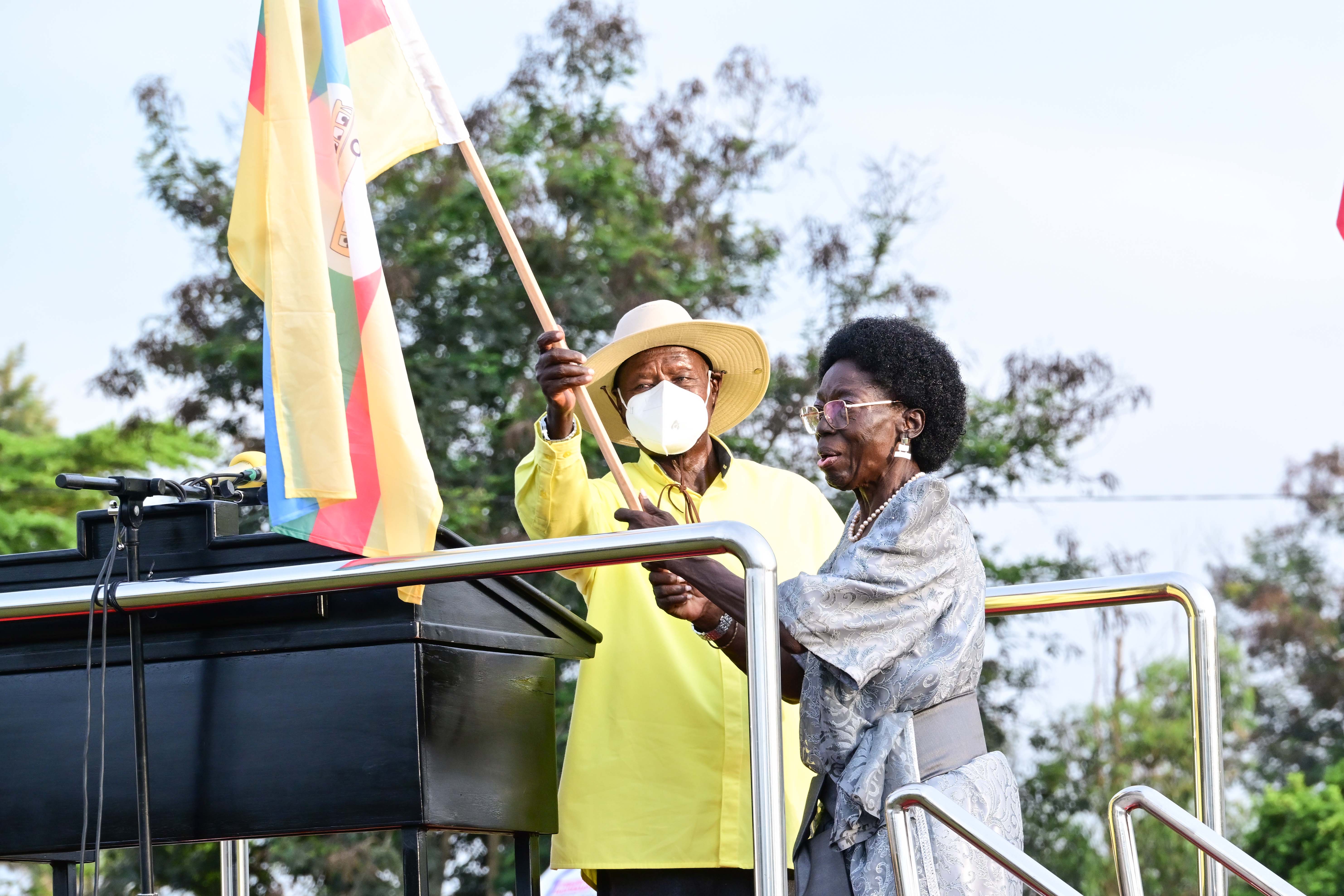President Museveni has appealed to Ugandans, particularly the people of Busoga, to renew the National Resistance Movement (NRM)’s mandate in the 2026 general elections, basing their decision on what he described as the party’s “seven factual contributions to Uganda’s house.”
The President, who was accompanied by the First Lady and Minister of Education and Sports, Janet Kataaha Museveni, made the remarks while addressing a massive campaign rally at Bupadhengo Primary School grounds in Kamuli District.
The rally formed part of his intensive week-long campaign tour across the Busoga sub-region ahead of the January 2026 elections.
President Museveni emphasized four of the seven achievements the NRM has delivered since 1986, including peace, development, wealth creation, and jobs.
He urged Ugandans to vote based on evidence rather than political rhetoric, arguing that NRM’s track record is clear for all to see.
He also criticized political opponents, whom he accused of having made no meaningful contribution to Uganda’s progress, warning residents not to heed “negative voices.”
The President expressed satisfaction that more Ugandans are now advocating for the establishment of industrial parks, which he said are crucial for job creation and economic transformation.
He noted that Uganda’s factories currently employ about 1.3 million people, almost three times the number of government jobs, which stand at 480,000.
He cited the Sino-Mbale Industrial Park, which hosts more than 75 factories, as a strong example of NRM-driven industrialization.
He also referenced the success story of Johnson Basangwa , a poultry farmer in Kamuli who employs 300 people, as evidence that targeted household enterprises can transform livelihoods more effectively than political contests.
The President reminded the crowd that the NRM’s first and most significant contribution was the restoration of peace and security.
He recounted Uganda’s troubled past—from the 1966 crisis that sent Kabaka Muteesa into exile, to the killings under Idi Amin, to the violent conflicts under Obote II—and emphasized that the NRM put an end to those cycles of instability.
He described peace as a factual achievement, not just a narrative.
President Museveni also cited infrastructure development as one of the NRM’s key contributions, listing roads, electricity, telecommunications, railways, schools, and hospitals among the milestones.
He announced several upcoming road projects whose funding he said has already been secured, including the Jinja–Budondo–Mbulamuti–Kamuli–Bukungu Road, 10 kilometers of Jinja City roads, the Iganga–Buloopa–Kamuli Road, and the Kamuli–Kaliro–Namwiwa–Pallisa Road.
He added that the Jinja–Kamuli Road has already been reconstructed, saying it will boost trade, agriculture, and industry in Busoga.
On wealth creation, President Museveni stressed that many people confuse national development with personal wealth, explaining that wealth must be generated at the household level.
He reiterated the 4-acre model introduced in the 1996 manifesto, which encourages farmers with small landholdings to diversify income through coffee, fruits, dairy zero-grazing, food crops, poultry, piggery, and fish farming.
He warned that small landholders should avoid copying large-scale farmers and once again pointed to Basangwa Johnson’s progress—from a small plot with 500 chickens to earning about Shs 20 million per day—as proof of the model’s effectiveness.
Maama Janet Museveni thanked Busoga residents for their large turnout and urged them to mobilize widely for the NRM, saying that doing so would strengthen Uganda’s governance and improve education.
Her message received loud cheers, especially from youth and women’s groups. Other senior party leaders who addressed the rally included NRM First National Vice Chairman Alhajji Moses Kigongo, First Deputy Prime Minister and Kamuli Woman MP Rebecca Kadaga, and Kamuli District NRM Chairperson Matthew Bazanya.
They all encouraged Busoga residents to turn out in large numbers and deliver a decisive win for the NRM.
Earlier in the day, President Museveni and the First Lady commissioned a US$50 million cassava starch processing plant in Namasagali, spearheaded by Dr. Matthias Magoola of Dei BioPharma Ltd.
The plant, which is the first phase of a larger industrial complex, will produce starch, glucose, maltose, and fructose—critical ingredients in pharmaceutical manufacturing that Uganda has long imported.
The facility is expected to create more than 40,000 direct and indirect jobs, provide a stable market for cassava farmers, reduce Uganda’s pharmaceutical import bill, and accelerate pharmaceutical self-reliance.
President Museveni praised Dr. Magoola’s initiative but cautioned small landholders against rushing into cassava farming for industry without understanding profitability, saying the country should avoid repeating past mistakes such as smallholders growing sugarcane on limited land.
The President will conclude his Busoga campaign tour with rallies in Jinja and Iganga on Friday, continuing to highlight the seven contributions of the NRM to Uganda as his central message to voters.


